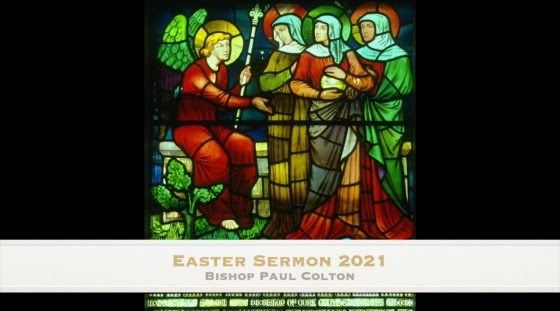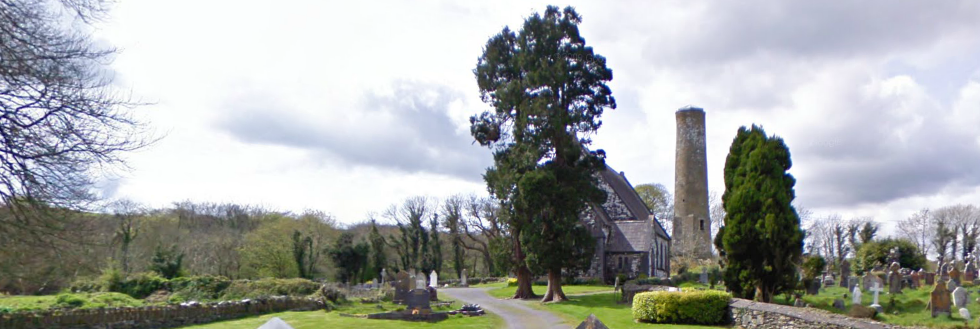Sermon preached on Easter Day
4th April 2021
in the Cathedral Church of Saint Fin Barre, Cork
by the Right Reverend Dr Paul Colton,
Bishop of Cork, Cloyne and Ross

You may either view the sermon preached on Easter Day 2021 by Bishop Paul Colton, or you may read it below.
View the sermon (with illustrations)
To view the sermon preached on Easter Day by Bishop Paul Colton, please
or, if you prefer to read the Sermon,
Here is the text of Bishop Colton’s Easter Sermon 2021
The Suez Canal has been much in the news over the last two weeks. That artificial and essential sea-level waterway – completed in 1869 – was blocked for a week by a container mega-ship: the MV Ever Given when it veered off course on 23rd March. On Apps such as MarineTraffic and on the news, ships could be seen queuing up in their 100s at both ends of the canal: in the Mediterranean Sea and the Red Sea. In fact, according to the news, the last of over 400 of those stranded ships was only going through the canal yesterday.
This regional hiatus was yet another reminder of how interdependent we are on this planet; of how an incident on the interface of two continents – Africa and Asia – of just one ship’s length, in a specific place, albeit on a stretch of waterway 193 km long, can affect us all, everywhere – disrupting international supply chains and raising costs. 12% of global trade, I’m told, goes through this nautical shortcut every year; goods worth about $1 trillion; fifty ships a day carrying cargo worth between $3 billion and $9 billion.
I was intrigued by all this; but for me it brought back another memory. In 1985 Susan and I were part of a team of voluntary workers who travelled to Egypt, to work at the School for the Deaf in Old Cairo which had at that time, been only recently, set up by the Anglican Diocese there . On one day off, we were driven out to the Isthmus of Suez, to stare into the desert: to Sinai, the triangular-shaped peninsula, part of Egypt that links Africa with Asia. I remember staring and staring at what to me, at any rate, coming from this green island, was the nothingness of desert – to my eye, arid, hostile and unwelcoming. And then a ship cut though both the desert view and my dreaming – like a mirage. It was, of course, navigating the waters of the Suez Canal, which from my vantage point were not visible.
I remember thinking that day of the biblical epic when the Israelites escaped from slavery in Egypt and, whether or not it was indeed that place, they ended up spending a generation wandering in that desert, in that wilderness. Sinai conjures up for believers ideas of hardship and endless wandering, of dislocation and uncertainty, of separation and grief. But it was also a place where the future was shaped; where the law was given, where they encountered God, and a covenant was made between them and God.
These are events which are called to mind every day in the Morning Prayer of the Church in the words of Psalm 95 – Venite – ‘Today if only you would hear his voice, do not harden your hearts, as you did in the wilderness.’ (Psalm 95.8)
For many people, for many of us, this past year of pandemic has been a wilderness time; and we don’t like it, far from it. We have searched for and longed to hear the voice of God. Both hardness of heart and softness of heart have shaped our fluctuating moods and emotions, our resilience and our vulnerabilities, our hopes and our anxieties.
For many people the days of lockdown at home have been times of disruption, rupture of routine, and, as those times were for the faithful in that biblical epic, these for us too have been days of dislocation and uncertainty, separation and grief. One hour, one day plods after another. For many there have been distressing days of illness and grief, and the calling to many to work at the extremes of professional capacity and human endurance – all a whirlwind, a maelstrom of wilderness that like that ship so recently in that place has thrown us all off course.
It is in such a distressing place – a place of wilderness of emotion, distress, grief and uprootedness – it is in such a place where we see the women in today’s Gospel – the story of Easter told in St Mark. This is the version of Easter that is announced in the stained glass of this 150 year old Cathedral. The three women approach the tomb early in the morning: Mary Magdalene, Mary the mother of James, and Salome.
In our rush to get to the joyous proclamation of Easter – to shout out Christ is risen! – to make that new beginning, it’s all too easy to forget the nothingness – the nothingness of yesterday, the wilderness of the Sabbath, the Saturday, the day before, and the day before that, that Friday that we can now call Good, with hindsight. They had been witnesses to the execution, death and burial of their inspiring friend, but this was more than grief. The day and nights those women had since he was killed were hell. It seemed to them that they had lost everything, everything that they had invested in during the past three years. And as a group, the disciples, their fellow disciples, were in chaos and disarray.
It is those women – tormented, grief-stricken, bereft, anxious, afraid, not knowing what lay ahead – those were the women who came early that morning. To them they had lost everything. They hadn’t even had the opportunity to give him proper funeral rites. And haven’t curtailed funerals have been such an element in our current times for far too many people? Now the women were coming to make up for it that morning, with the spices to anoint the body of Jesus. On top of everything else they were worried – ‘Who will roll away the stone for us from the entrance to the tomb?’ As they approached, it was the first thing they noticed; someone had already moved the large stone.
As they went into the burial chamber they were startled to see a young man, dressed in white, already sitting there on the right hand side. The young man tried to calm them down. He knew they were looking for Jesus. ‘He has been raised; he is not here.’ he said ‘Look, there is the place they laid him. But go, tell his disciples and Peter that he is going ahead of you to Galilee; there you will see him, just as he told you.’
And all this was yet another shock to the system. We are told they ‘…fled from the tomb, for terror and amazement had seized them; and they said nothing to anyone, for they were afraid.’
There, Saint Mark’s account of this day ends abruptly.
But we are invited, in the middle of these wilderness times – during this pandemic – to draw strength and hope from it. To carry it on and through into our own lives and our living even now centuries later. As the wandering people of God encountered God in that desert, in that wilderness all those centuries ago, during these times we are invited to meet God again this Easter, in the solidarity of his suffering and sacrifice on the cross, in the painful not-knowing of the day in between, and in the hope, joy and triumph of his resurrection.
‘You will see him,’ said the young messenger to the women that day in the Gospel. And they did and we still do. Jesus is in the present; he’s not confined to the past. This has been the experience of Christians in every age; and even in these demanding times – demanding, to say the least – we are invited to draw strength from God’s presence, and from the hand of God and the voice of God, reaching out to us in others around us, who are responding to the new command he left them that night before he died, when he say down with them at that memorable supper and said to them: ‘Love one another…. Just as I have loved you, you also should love one another.’ (John 13.34) Dear friends, Easter gives us hope to journey on and to do what we need to do, as we too pray and work for these times of pandemic to be unblocked and to pass.
Latest News and Photos from the Church of Ireland Diocese of Cork, Cloyne and Ross | | URL: https://wp.me/p1GvjR-2Xq
